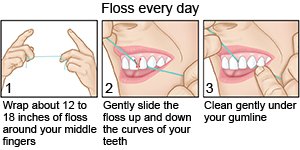Periodontal Disease
Medically reviewed by Drugs.com. Last updated on May 6, 2024.
What is periodontal disease?
Periodontal disease is also called gum disease. It can be mild and cause problems such as bad breath. It can progress and in severe cases, it can destroy bone and lead to tooth loss.
What causes gum disease?
Gum disease is usually caused by the buildup of plaque on your teeth and gums. Plaque contains bacteria that are harmful to the gum tissue.
What increases my risk for gum disease?
- Poor oral hygiene such as not brushing and flossing your teeth
- Poor nutrition
- Certain medicines that decrease the saliva in your mouth
- Genetics, or medical conditions such as diabetes and Down syndrome
- Tobacco, smoked or chewed
What are the signs and symptoms of gum disease?
- In the early stages of gum disease (gingivitis):
- Your gums bleed when you brush or floss your teeth.
- Your gums are swollen, red, or tender.
- You have bad breath that does not go away.
- As the gum disease gets worse:
- Tartar (crust) forms on your teeth.
- Your gums bleed and move away from your teeth.
- Your teeth can become loose and possibly fall out.
How is gum disease diagnosed?
Your dental provider will look at your teeth and gums. He or she will take x-rays of your mouth. The exam will show the health of your gums. The x-rays will show the health of your bones.
How is gum disease treated?
Your dental provider can do most of the treatment for gum disease. The most common treatment is a good dental cleaning above and below the gum line. You may be given a medical mouth rinse or gel to kill the bacteria. In some cases you may be referred to a specialist or need surgery.
How can I prevent gum disease?
- Brush your teeth 2 times every day. Brush for 2 minutes each time.
- Floss daily. Your dental provider can teach you how to floss properly.

- Use a toothpaste that contains fluoride. You may also need to use a mouth rinse that contains fluoride.
- Use a soft-bristled toothbrush. Hard bristles may damage your gums.
- Change your toothbrush every 3 to 4 months. Worn out toothbrushes can damage your gums and do not remove plaque well.
- Eat healthy foods. Avoid sweets between meals to decrease your risk for gum disease. Healthy foods do not form plaque as easily as foods high in sugar. Eat a variety of fruits, vegetables, lean meats, fish, low-fat dairy products, whole-grain breads, and cooked beans.
- Do not smoke, and do not use chewing tobacco. Tobacco increases your risk for gum disease. It is never too late to quit using tobacco. Ask your healthcare provider for information if you need help quitting.
- Visit your dentist every 6 months, or more often as directed, for cleaning and preventive care. Regular visits will help find problems early.
When should I contact my dental provider?
- Your gums bleed regularly when you floss or brush your teeth.
- Your gums are swollen or tender.
- Your gums start to move away from your teeth.
- Your teeth become loose.
- You have questions or concerns about your condition or care.
Care Agreement
You have the right to help plan your care. Learn about your health condition and how it may be treated. Discuss treatment options with your healthcare providers to decide what care you want to receive. You always have the right to refuse treatment. The above information is an educational aid only. It is not intended as medical advice for individual conditions or treatments. Talk to your doctor, nurse or pharmacist before following any medical regimen to see if it is safe and effective for you.© Copyright Merative 2024 Information is for End User's use only and may not be sold, redistributed or otherwise used for commercial purposes.
Further information
Always consult your healthcare provider to ensure the information displayed on this page applies to your personal circumstances.
